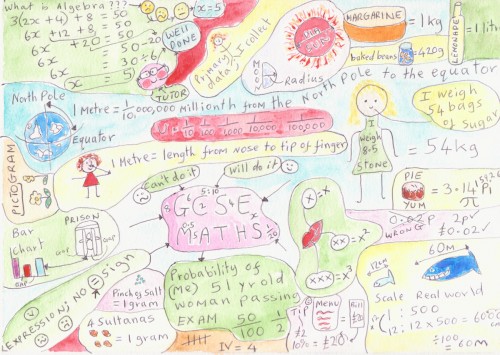Tag archives: teaching
Award-winning ‘Bailys Beads’, schoolyard accelerators , pulsar poems and more
By Tushna Commissariat
Its officially that time of the year again when we can marvel at this year’s winners of the Insight Astronomy Photographer of the Year 2016. The awards ceremony, held at the Royal Greenwich Observatory, has unveiled some truly spectacular and ethereal shots of our universe. The overall winner this year is a truly amazing composite image of the 2016 total solar eclipse that shows the ‘Baily’s Beads’ phenomenon and was taken by photographer Yu Jun in Luwuk, Indonesia. In the video above, the judges explain why this particular image was the main winner for the year.
View all posts by this author | View this author's profile
Blood Moons, teachers who moulded the minds of great physicists and more
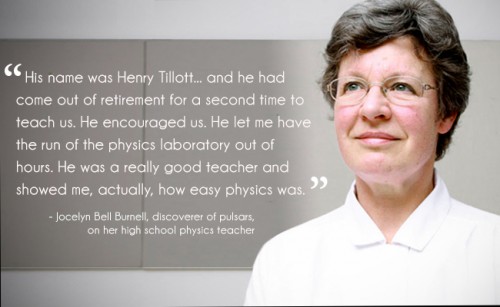
Jocelyn Bell Burnell on her high-school physics teacher. (Courtesy: Perimeter Institute for Theoretical Physics)
By Tushna Commissariat
This week has been an exciting and busy one at Physics World HQ, what with two Nobel prizes that included physics – the actual Nobel prize for physics, of course, as well as this year’s chemistry Nobel, which was given to three physicists. Since last week’s Red Folder was full of Nobel trivia and facts, I will only point you to two more interesting Nobel-related articles. The first is an excellent article on the Slate website, by one of our regular freelance authors Gabriel Popkin, where he looks at female physicists who deserve a Nobel. His list is in no way exhaustive, but does well to highlight some excellent work done by women that deserves recognition, so do take a look at “These women should win a Nobel prize in physics”. Also, Ethan Siegel from the Starts With a Bang! blog has written an excellent essay to silence any would-be naysayers about the worthiness of giving the Nobel to the researchers who developed blue LEDs. In “Why blue LEDs are worth a Nobel Prize”, he outlines the history of LEDs and talks about just how many applications they have in today’s times.
View all posts by this author | View this author's profile
Discovering your inner scientist
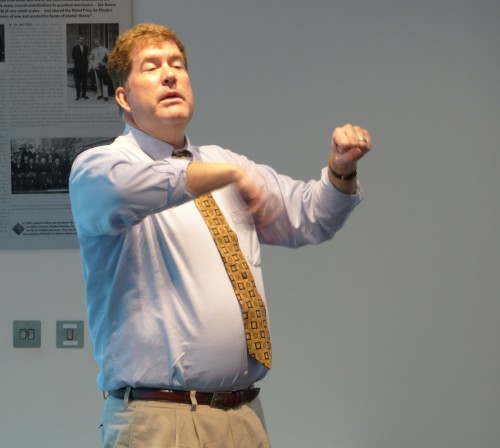
Chad Orzel in action.
By Matin Durrani
Chad Orzel writes one of the most active and longest running science blogs on the net, having posted the first entry on his blog Uncertain Principles back in June 2002. A physicist at Union College in Schenectady, New York, he’s also written two popular-science books, based on the cute premise of trying to teaching first quantum physics and then relativity to his dog.
So, a couple of months back, when we noticed that Orzel was coming to the UK, we decided to invite him to give a talk as part of the Bristol Festival of Ideas. Orzel kindly accepted our offer and last night saw him speak here at the offices of IOP Publishing, which publishes Physics World. The talk was entitled Eureka! Discovering Your Inner Scientist, which just happens to be the title of Chad’s next book. (And what’s wrong with a spot of self-publicity?)
View all posts by this author | View this author's profile
Fran Scott’s four golden rules for getting kids hooked on science

Science presenter Fran Scott with CBBC puppet Hacker T Dog. (Courtesy: CBBC)
By Matin Durrani
“Ever heard a child say ‘Yeah, I get it!’? Well, if you do, they’re lying. They’re only saying those words because you’re boring them and they don’t want to listen any more.”
That’s not me telling you – it’s Fran Scott, a BBC science presenter who has spent the last nine years involved in informal children’s science education, most recently working for Children’s BBC and BBC Learning.
View all posts by this author | View this author's profile
Making brain-busting ideas easier to grasp
By Matin Durrani
With all the talk yesterday of evidence for inflation and signs of primoridal gravitational waves imprinted on the cosmic microwave background, many non-physicists (and probably quite a few physicists too) might have been left scratching their heads at the implications of the findings obtained by the BICEP2 experiment at the South Pole.
Unfortunately, there’s no getting away from the fact that many concepts in physics are hard and that cutting-edge experiments are incredible feats of technical endeavour. We can, though, all take solace from the fact that physicists at the frontiers of research have often spent decades living and breathing their subjects, which means they know the basics of their own field far better than anyone else.
New ways to teach and learn physics
By Matin Durrani
If there’s one thing that unites pretty much all of us who like physics, it’s that we’ve all sat through physics classes at some point in our lives. We all know teachers and lecturers who’ve been brilliant and inspired us, but equally we’ve all sat through classes that have quite frankly bored us out of our pants.
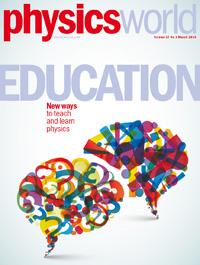
In the March 2014 issue of Physics World – a PDF copy of which you can download free of charge – we offer a snapshot of just some of the many innovative ideas that exist for learning and teaching physics. It’s not an exhaustive selection, but includes topics that we felt were interesting or novel.
So, download the issue to find out about the huge growth of “massive open online courses”, or MOOCs, in which universities make their lectures freely available in video form on the Internet, and discover Philip Moriarty’s behind-the-scenes experiences as one of the stars of the Sixty Symbols series of YouTube science videos.
Elsewhere, check out the great feature by BBC science presenter Fran Scott, who reveals her four golden rules for engaging children with science, and discover the importance of helping children develop computer-programming skills from an early age. Don’t miss out either on Eugenia Etkina and Gorazd Planinšič’s article on the implications for teachers of the fact that learning involves physical changes in the brain.
View all posts by this author | View this author's profile
A black-belt physicist

Julie McGavigan, expert in physics and karate.
By Michael Banks
Not many school pupils can boast having had a world-champion physics teacher, so say hello to Julie McGavigan, who teaches physics at Eastwood High School near Glasgow and bagged a gold medal at the World Karate Championships in Denmark in October.
The 27 year old, who says the win in Denmark came as “quite a shock”, is a 3rd Dan in Shotokan karate and has taught physics for five years after studying the subject at the University of Glasgow.
McGavigan also teaches karate at evening classes at Eastwood High, where she puts physics principles to good use. “Physics helps me understand why certain stances, moves and combinations work when practising karate,” McGavigan told physicsworld.com.
View all posts by this author | View this author's profile
Institute of Physics launches fundraising campaign
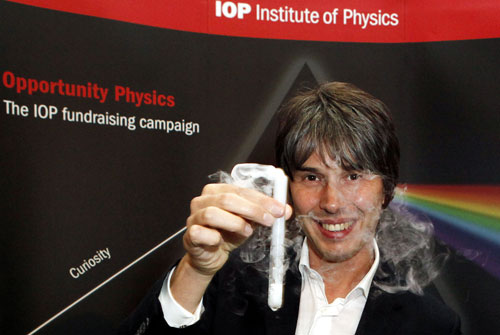
Manchester University physicist Brian Cox at the launch of the Institute of Physics’ fundraising campaign on 23 September 2013. (Courtesy: Richard Lewis)
By Matin Durrani
The Institute of Physics (IOP), which publishes Physics World, launched its first-ever fundraising campaign at a dinner at the Institute’s headquarters in London last night. The aim of the campaign, called Opportunity Physics, is to raise £10m over five years to let the Institute “significantly scale up” its work over the coming decades. The evening was hosted by Manchester University particle physicist Brian Cox, who is on the fundraising campaign’s board and is a familiar face as presenter of TV shows such as the BBC’s Wonders of the Solar System.
The Institute says it has identified a number of existing IOP projects that can be enhanced if further funding were available. Those projects are all centred on inspiring young people into physics, showing them what careers physics can lead to, helping physicists to flourish – whether they work in teaching, research or industry – and underlining how physics is central to a healthy, technology-led economy. With 52,000 members, the Institute already does a lot of good work, but it believes it can do even more with additional cash.
View all posts by this author | View this author's profile
